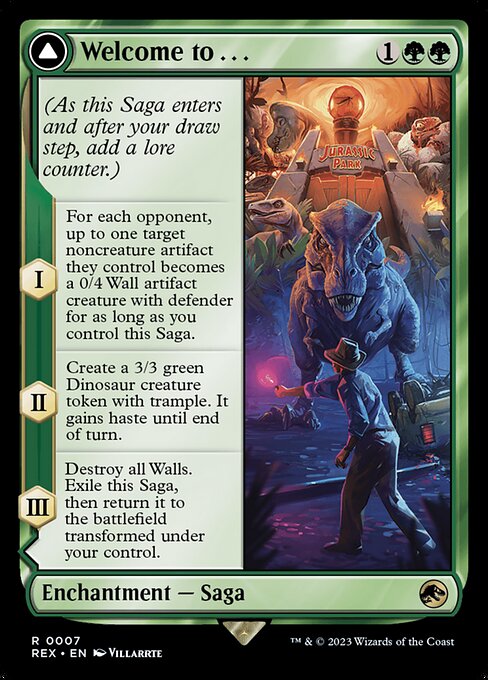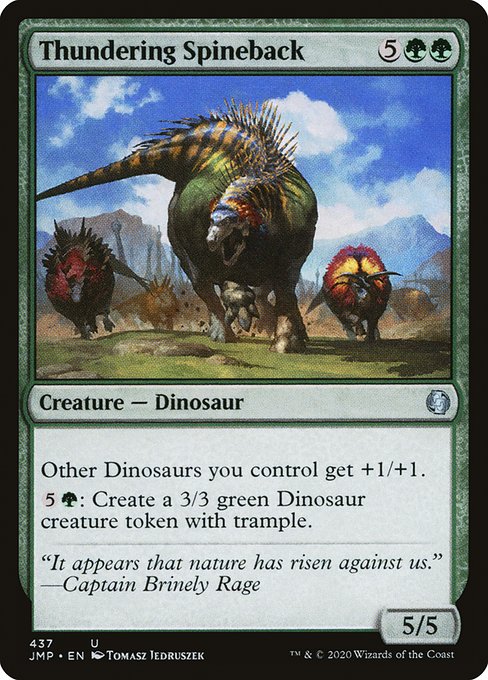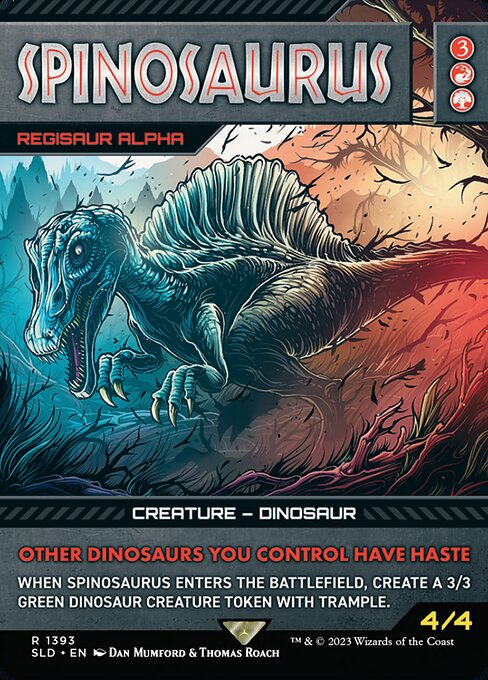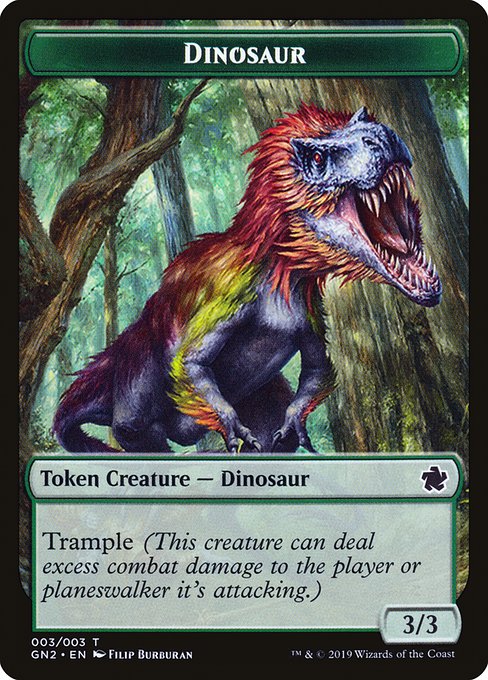Bienvenue à... // Jurassic Park
//
Enchantement — saga // Terrain légendaire
(Au moment où cette saga arrive sur le champ de bataille et après votre étape de pioche, ajoutez un marqueur « sapience ».)
I — Pour chaque adversaire, jusqu'à un artefact non-créature ciblé qu'il contrôle devient une créature-artefact 0/4 Mur avec le défenseur tant que vous contrôlez cette saga.
II — Créez un jeton de créature 3/3 verte Dinosaure avec le piétinement. Il acquiert la célérité jusqu'à la fin du tour.
III — Détruisez tous les murs. Exilez cette saga, puis renvoyez-la sur le champ de bataille, transformée et sous votre contrôle. // (Transformation de Bienvenue à...
Chaque carte de dinosaure dans votre cimetière a l'échappée. Le coût d'échappée est égal au coût de mana de la carte plus l'exil de trois autres cartes de votre cimetière. (Vous pouvez lancer des cartes depuis votre cimetière pour leur coût d'échappée.)
: Ajoutez pour chaque dinosaure que vous contrôlez.
I — Pour chaque adversaire, jusqu'à un artefact non-créature ciblé qu'il contrôle devient une créature-artefact 0/4 Mur avec le défenseur tant que vous contrôlez cette saga.
II — Créez un jeton de créature 3/3 verte Dinosaure avec le piétinement. Il acquiert la célérité jusqu'à la fin du tour.
III — Détruisez tous les murs. Exilez cette saga, puis renvoyez-la sur le champ de bataille, transformée et sous votre contrôle. // (Transformation de Bienvenue à...
Chaque carte de dinosaure dans votre cimetière a l'échappée. Le coût d'échappée est égal au coût de mana de la carte plus l'exil de trois autres cartes de votre cimetière. (Vous pouvez lancer des cartes depuis votre cimetière pour leur coût d'échappée.)
: Ajoutez pour chaque dinosaure que vous contrôlez.
standard
future
historic
gladiator
pioneer
explorer
modern
legacy
pauper
vintage
penny
commander
brawl
alchemy
paupercommander
duel
oldschool
premodern
Rulings
If Welcome to… leaves the battlefield before its first chapter ability resolves, that ability will have no effect. The target noncreature artifacts won't become Walls at all.
Escape's permission doesn't change when you may cast the spell from your graveyard.
If a card with escape is put into your graveyard during your turn, you'll be able to cast it right away if it's legal to do so, before an opponent can take any actions.
If you cast a spell with its escape permission, you can't choose to apply any other alternative costs or to cast it without paying its mana cost. If it has any additional costs, you must pay those.
A noncreature permanent that turns into a creature can attack, and its abilities can be activated, only if its controller has continuously controlled that permanent since the beginning of their most recent turn. It doesn't matter how long the permanent has been a creature.
Once you begin casting a spell with escape, it immediately moves to the stack. Players can't take any other actions until you're done casting the spell.
If a spell you're casting with escape has an additional cost of discarding cards or sacrificing permanents, you may exile cards discarded or sacrificed this way to pay that part of its escape cost.
If you're casting an adventurer card or split card with escape, you choose how you wish to cast it, then pay the appropriate cost (for the Adventure, the creature, or the half of the split card you chose) plus exiling three cards.
If a card has multiple abilities giving you permission to cast it, such as two escape abilities or an escape ability and a flashback ability, you choose which one to apply. The others have no effect.
After an escaped spell resolves, it returns to its owner's graveyard if it's not a permanent spell. If it is a permanent spell, it enters the battlefield and will return to its owner's graveyard if it dies later. Perhaps it will escape again—good underworld security is so hard to come by these days.
To determine the total cost of a spell, start with the mana cost or alternative cost you're paying (such as an escape cost), add any cost increases, then apply any cost reductions. The mana value of the spell remains unchanged, no matter what the total cost to cast it was and no matter whether an alternative cost was paid.
Escape's permission doesn't change when you may cast the spell from your graveyard.
If a card with escape is put into your graveyard during your turn, you'll be able to cast it right away if it's legal to do so, before an opponent can take any actions.
If you cast a spell with its escape permission, you can't choose to apply any other alternative costs or to cast it without paying its mana cost. If it has any additional costs, you must pay those.
A noncreature permanent that turns into a creature can attack, and its abilities can be activated, only if its controller has continuously controlled that permanent since the beginning of their most recent turn. It doesn't matter how long the permanent has been a creature.
Once you begin casting a spell with escape, it immediately moves to the stack. Players can't take any other actions until you're done casting the spell.
If a spell you're casting with escape has an additional cost of discarding cards or sacrificing permanents, you may exile cards discarded or sacrificed this way to pay that part of its escape cost.
If you're casting an adventurer card or split card with escape, you choose how you wish to cast it, then pay the appropriate cost (for the Adventure, the creature, or the half of the split card you chose) plus exiling three cards.
If a card has multiple abilities giving you permission to cast it, such as two escape abilities or an escape ability and a flashback ability, you choose which one to apply. The others have no effect.
After an escaped spell resolves, it returns to its owner's graveyard if it's not a permanent spell. If it is a permanent spell, it enters the battlefield and will return to its owner's graveyard if it dies later. Perhaps it will escape again—good underworld security is so hard to come by these days.
To determine the total cost of a spell, start with the mana cost or alternative cost you're paying (such as an escape cost), add any cost increases, then apply any cost reductions. The mana value of the spell remains unchanged, no matter what the total cost to cast it was and no matter whether an alternative cost was paid.
Rulings
If Welcome to… leaves the battlefield before its first chapter ability resolves, that ability will have no effect. The target noncreature artifacts won't become Walls at all.
Escape's permission doesn't change when you may cast the spell from your graveyard.
If a card with escape is put into your graveyard during your turn, you'll be able to cast it right away if it's legal to do so, before an opponent can take any actions.
If you cast a spell with its escape permission, you can't choose to apply any other alternative costs or to cast it without paying its mana cost. If it has any additional costs, you must pay those.
A noncreature permanent that turns into a creature can attack, and its abilities can be activated, only if its controller has continuously controlled that permanent since the beginning of their most recent turn. It doesn't matter how long the permanent has been a creature.
Once you begin casting a spell with escape, it immediately moves to the stack. Players can't take any other actions until you're done casting the spell.
If a spell you're casting with escape has an additional cost of discarding cards or sacrificing permanents, you may exile cards discarded or sacrificed this way to pay that part of its escape cost.
If you're casting an adventurer card or split card with escape, you choose how you wish to cast it, then pay the appropriate cost (for the Adventure, the creature, or the half of the split card you chose) plus exiling three cards.
If a card has multiple abilities giving you permission to cast it, such as two escape abilities or an escape ability and a flashback ability, you choose which one to apply. The others have no effect.
After an escaped spell resolves, it returns to its owner's graveyard if it's not a permanent spell. If it is a permanent spell, it enters the battlefield and will return to its owner's graveyard if it dies later. Perhaps it will escape again—good underworld security is so hard to come by these days.
To determine the total cost of a spell, start with the mana cost or alternative cost you're paying (such as an escape cost), add any cost increases, then apply any cost reductions. The mana value of the spell remains unchanged, no matter what the total cost to cast it was and no matter whether an alternative cost was paid.
Escape's permission doesn't change when you may cast the spell from your graveyard.
If a card with escape is put into your graveyard during your turn, you'll be able to cast it right away if it's legal to do so, before an opponent can take any actions.
If you cast a spell with its escape permission, you can't choose to apply any other alternative costs or to cast it without paying its mana cost. If it has any additional costs, you must pay those.
A noncreature permanent that turns into a creature can attack, and its abilities can be activated, only if its controller has continuously controlled that permanent since the beginning of their most recent turn. It doesn't matter how long the permanent has been a creature.
Once you begin casting a spell with escape, it immediately moves to the stack. Players can't take any other actions until you're done casting the spell.
If a spell you're casting with escape has an additional cost of discarding cards or sacrificing permanents, you may exile cards discarded or sacrificed this way to pay that part of its escape cost.
If you're casting an adventurer card or split card with escape, you choose how you wish to cast it, then pay the appropriate cost (for the Adventure, the creature, or the half of the split card you chose) plus exiling three cards.
If a card has multiple abilities giving you permission to cast it, such as two escape abilities or an escape ability and a flashback ability, you choose which one to apply. The others have no effect.
After an escaped spell resolves, it returns to its owner's graveyard if it's not a permanent spell. If it is a permanent spell, it enters the battlefield and will return to its owner's graveyard if it dies later. Perhaps it will escape again—good underworld security is so hard to come by these days.
To determine the total cost of a spell, start with the mana cost or alternative cost you're paying (such as an escape cost), add any cost increases, then apply any cost reductions. The mana value of the spell remains unchanged, no matter what the total cost to cast it was and no matter whether an alternative cost was paid.
Votre collection ? vos decks ?
Envie de gérer votre collection et/ou créer des decks ?


 0
0
 14.00€
14.00€


